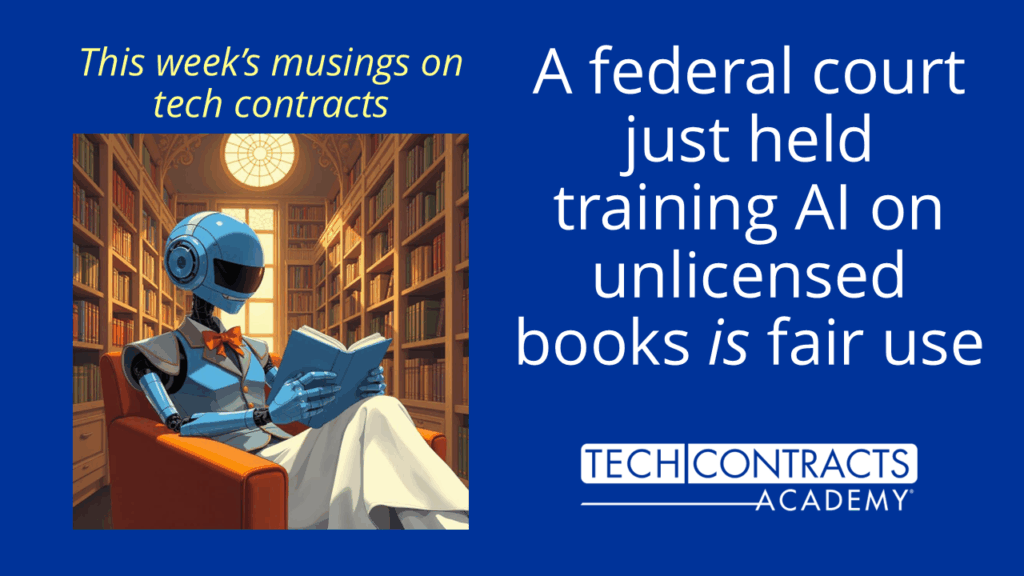This week’s musings on tech contracts…
On Monday, a U.S. federal district court held that AI vendors don’t infringe copyright when they train gen-AI on unlicensed books. The “fair use” exception protects AI training.
The decision in Bartz v. Anthropic is bad news for authors, artists, publishers, and other copyright-holders. If it guides future law, copyright-holders will have no right to compensation for unauthorized use of their work to train.
That doesn’t necessarily mean copyright-holders have no remedy against AI outputs that look suspiciously similar to their books, videos, etc. The court addressed infringement through training, not through reproduction of outputs.

The battle’s not over
The copyright battle over training data will go on, for three reasons.
First, we don’t know the decision’s reach. The plaintiffs were authors of books that the defendant, Anthropic, digitized and used to train its systems. To what extent does their loss apply to other works of authorship: photos, videos, articles, songs, etc.? For that matter, to what extent does it apply to other companies’ training procedures and use of trained models? The answer may seem obvious. Why wouldn’t the court’s rule apply to all works of authorship and all training? But fair use is notoriously hard to pin down. It’s a squirrely, heavily fact-dependent determination. So while the decision may serve as precedent for other AI copyright battles, it’s not a rock-solid guide.
Second, the decision will be appealed. So the Ninth Circuit Court of Appeals could reverse Judge Alsup’s holding in Bartz v. Anthropic.
Third, other federal courts could reach different conclusions on fair use. We might not get a final, reliable national rule until one or more of these cases triggers a Supreme Court decision.
Liability for Anthropic rivaling the U.S. deficit?
The decision represents a big victory for defendant Anthropic, but it could come at a staggering price. Anthropic got digital copies of the authors’ books in various ways, including through pirate sites. The court didn’t decide whether use of pirated books to train AI infringes copyright. But it did hold that storing pirated books in Anthropic’s digital library, for a variety of uses, may infringe. (So the court refused the defense’s motion for summary judgment on that point.) That means Anthropic goes to trial on the piracy. And the trial could address more than seven million books, since it’s a putative (would-be) class action. In other words, if the judge ultimately accepts a plaintiff class including the authors of all seven million books, and Anthropic loses at trial, it could have to pay all those authors.
Copyright statutory damages start at $750 per work. So Anthropic’s liability for infringing seven million copyrights could be $5.25 billion. But typical statutory damages can go higher, up to $30,000 per work. That would give Anthropic a bill of $210 billion. And for willful infringement, the plaintiff can get $150,000 per work – and Anthropic apparently admits it knew the books were pirated. That opens the door to damages of … $1.05 trillion.
Don’t sell your Anthropic stock quite yet. (If you have any. It’s not publicly traded.) The class could be much smaller and might not get certified at all. And Anthropic could win at trial, and it could successfully appeal Monday’s ruling. In fact, any number of legal maneuvers could come between the plaintiffs and those eye-popping awards.
Final thoughts
Judge Alsup’s decision in Bartz v. Anthropic runs just 32 pp., and it’s relatively accessible, even for non-lawyers. So have a look if you’re interested.
Also, FYI, I used to represent Anthropic, and I used to work for Judge Alsup (when he was a scary partner at Morrison & Foerster). Does that mean I have a dog in this fight? No, but it’s important to point out.
THIS ARTICLE IS NOT LEGAL ADVICE. IT IS GENERAL IN NATURE AND MAY NOT BE SUFFICIENT FOR A SPECIFIC CONTRACTUAL, TECHNOLOGICAL, OR LEGAL PROBLEM OR DISPUTE, AND IT IS NOT PROVIDED WITH ANY GUARANTEE, WARRANTY, OR REPRESENTATION. LEGAL SITUATIONS VARY, SO BEFORE ACTING ON ANY SUGGESTION IN THIS ARTICLE, YOU SHOULD CONSULT A QUALIFIED ATTORNEY REGARDING YOUR SPECIFIC MATTER OR NEED.
© 2025 Tech Contracts Academy, LLC
